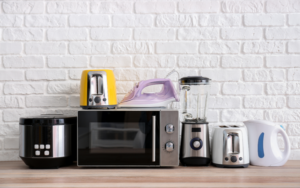
Households across the UK are continuing to feel the squeeze as everyday living costs remain high.
In this article, we look at how much it costs to use the electrical appliances around your home and how you can save money on your household energy bills. We also look at the help available for those struggling to afford their energy bills.
How much does energy cost?
Ofgem announced a new price cap of £1,738 from 1st January 2025 which means that the average price for a unit of gas and electricity in the UK is 24.86p per kWh for electricity and 6.34p per kWh for gas. The price cap means that the average household bill will be around £1,738 per year. However, how much you actually pay does vary depending on how much energy you use.
The following table shows how much you can expect to pay for electricity and gas per unit you use as well as the daily payable standing charge.
| Gas charges | Electricity charges | |
| Energy Price Cap
From 1st January 2025 |
31.65p daily standing charge
6.34p per kWh |
60.97p daily standing charge
24.86p per kWh |
Remember that the quoted rates are per unit of gas and electricity that you use and you could therefore pay more or less for your energy depending on your actual usage.
What is an energy efficiency rating and how does it work?
When purchasing electrical appliances you may have noticed that they come with an energy label, particularly on bigger purchases such as your fridge, dishwasher or washing machine. Energy labels include a rating of the appliance from A - G, with A being the most energy efficient and G being the least energy efficient. As well as providing the energy rating, an energy label also includes information about the appliance, the manufacturer and its expected energy use over a period of time. The more energy efficient your appliance is, the more expensive it usually is to buy, however, the appliance could work out cheaper over time by using less energy and cutting down your energy costs. If you want to compare the energy efficiency of an appliance you own, you can do so using this handy tool tool.
When buying or selling a home you will need to provide or be provided with an energy performance certificate. This provides information on the energy efficiency of the property including the current energy rating as well as a potential energy rating on the property. Additionally, the energy performance certificate provides recommendations on how to improve the energy efficiency of your home. If you want to see the energy performance certificates for your home you can do so via the government website..
How much does it cost to use your electrical appliances?
With the cost of energy remaining high it can be handy to know how much energy you are using around the home in a bid to try and reduce your energy usage and save money. In the following tables, we highlight how much energy various appliances in your home use and how much this will cost you over a period of time. The figures in the table are based on Ofgem's energy price cap with an average charge of 24.86p per kWh of electricity used and the average wattage of each appliance. You can use Citizen Advice's handy calculator to estimate your own annual electrical usage, remember to enter the correct unit per kWh as per your energy bill. Alternatively, you could calculate the cost of each device by multiplying the kilowatt per hour (kWh) by the cost per unit of energy and then multiplying this hourly rate by how long you will use the device.
Remember, it could cost you more or less to use each appliance depending on the energy efficiency of your appliance and how long you use each appliance for.
How much does it cost to use kitchen appliances?
| Appliance | Time used (daily) | Daily cost | Monthly cost (if used daily) | Annual cost (if use daily) |
| Air Fryer | 30 mins | £0.11 | £3.16 | £38.46 |
| Dishwasher (Eco cycle) | 3 hours 31 mins | £0.23 | £6.89 | £83.79 |
| Extractor Fan | 1 hour | <£0.01 | £0.14 | £1.75 |
| Electric grill or hob | 30 mins | £0.18 | £5.40 | £65.70 |
| Standard fridge-freezer (EPC rating: D) | 24 hours | £0.08 | £2.65 | £31.83 |
| Kettle | 15 mins | £0.18 | £5.40 | £65.70 |
| Microwave | 10 mins | £0.04 | £1.20 | £14.60 |
| Oven (fan) | 1 hour | £0.34 | £10.18 | £123.87 |
| Slow cooker | 6 hours | £0.29 | £8.64 | £105.12 |
| Toaster | 10 mins | £0.04 | £1.20 | £14.60 |
| Tumble dryer (condenser) | 2 hours 31 mins | £1.17 (1 cycle per day) | £35.13 | £427.47 |
| Tumble dryer (heat pump) | 3 hours 26 mins | £0.49 (1 cycle per day) | £14.61 | £177.75 |
| Washing machine (Eco cycle) | 3 hours 41 mins | £0.31 (1 cycle per day) | £9.23 | £112.29 |
| LED light | 3 hours | £0.01 | £0.17 | £2.10 |
Gas vs electric appliances
If you use a gas hob or oven in your kitchen you may be wondering how much it costs compared to cooking with an electric hob or oven. In terms of usage, you will use more units of gas when cooking using your gas appliances but this does not mean it will be more expensive. At present, gas is cheaper than electricity at an average of 6.34p per unit compared to 24.86p per unit of electricity (based on the current energy price cap set by the energy regulator Ofgem). Therefore, even though you will use more per unit of energy, it is still likely to cost you less to use gas appliances.
How much does it cost to use bedroom appliances?
| Appliance | Time used (daily) | Daily cost | Monthly cost | Annual cost |
| Games console | 1 hour | £0.03 | £0.86 | £10.51 |
| Hairdryer | 15 mins | £0.12 | £3.60 | £43.80 |
| Phone or tablet charger | 6 hours | £0.01 | £0.43 | £5.26 |
| TV | 2 hours | £0.06 | £1.73 | £21.02 |
| Bedroom light (LED) | 2 hours | <£0.01 | £0.12 | £1.40 |
How much does it cost to use bathroom appliances?
| Appliance | Time used (daily) | Daily cost | Monthly cost | Annual cost |
| Electric shower | 10mins | £0.36 | £10.80 | £131.40 |
| Towel rail | 2 hours | £0.22 | £6.48 | £78.84 |
| Bathroom light (LED) | 1 hour | <£0.01 | £0.06 | £0.70 |
How much does it cost to use living room appliances?
| Appliance | Time used (daily) | Daily cost | Monthly cost | Annual cost |
| Broadband router | 24 hours | £0.06 | £1.73 | £21.02 |
| DVD/Blu-Ray player | 2 hours | £0.02 | £0.58 | £7.01 |
| Games console | 1 hour | £0.03 | £0.86 | £10.51 |
| Lightbulb (CFL 800 lumens) | 3 hours | £0.01 | £0.30 | £3.68 |
| PC/desktop computer | 8 hours | £0.27 | £8.06 | £98.11 |
| TV | 3 hours | £0.09 | £2.59 | £31.54 |
| TV box (e.g. Sky) | 3 hours | £0.03 | £0.86 | £10.51 |
| Vacuum cleaner | 15 mins | £0.05 | £1.62 | £19.71 |
How much money can you save by turning off appliances?
According to research in March 2024, by comparison site Quotezone UK domestic households could save an average of £103 a year by turning off household electronics left on standby overnight. For example, leaving your gaming console on standby could cost you £27.52 per year, while leaving your laptop on standby could cost £10.41 per year. We share how much you could save by turning off devices on standby in our article, 'Revealed: The cost of leaving household devices on standby'.
How to save money on your energy bills
Below are some money-saving tips that you can implement in your home to save money on your energy bills. We also share some additional money-saving tips in our article, ‘How to save on your household bills’.
How to save money on your utility bills:
- Use energy-saving light bulbs
- Get energy-efficient appliances when buying/replacing items around the home
- Turn off appliances instead of leaving them on standby
- Use eco settings on appliances where possible
- Turn the water off when brushing your teeth
- Shower instead of a bath
- Install a water butt
- Get a smart meter to understand how much energy you are using
What to do if you’re struggling to afford your bills
If you are finding it difficult to manage the increase in the cost of living you may be entitled to some help towards your bills. The household support fund is a government programme that provides targeted financial support for vulnerable people or those who cannot afford essentials such as food, energy bills and water. The UK government have now extended this scheme until April 2025. We look at additional grants and support schemes available in the UK in our article, ‘A complete guide to Cost of Living Payments - are you eligible?’
If you are struggling to keep up with your energy bills you should contact your provider as soon as possible to agree on an affordable payment plan. There are also numerous charities and websites that offer additional help and support to those struggling with debt. Read our article to find out where to get free debt advice.



